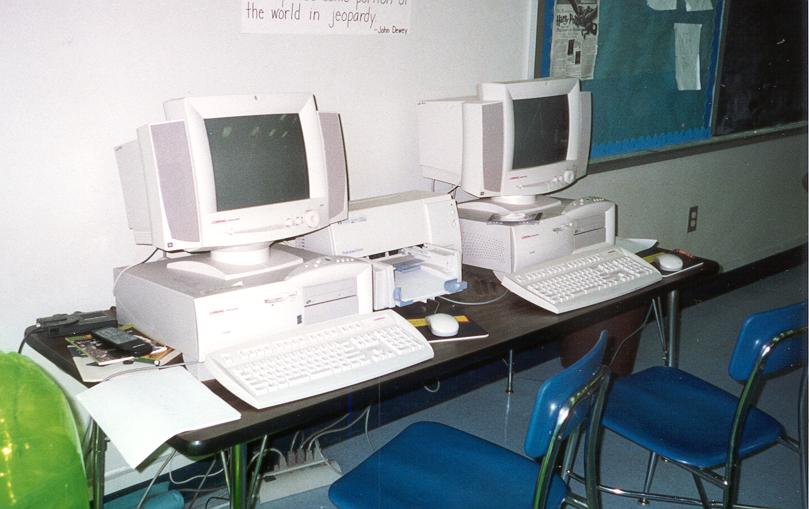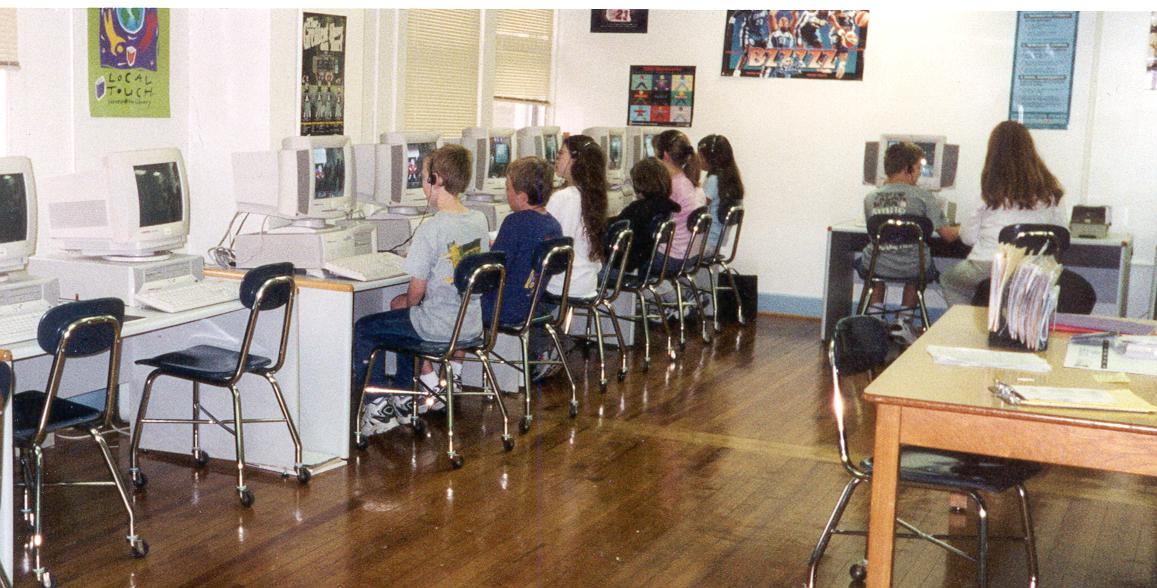Technology Center
A. Pictures of the two technology centers


( in the classroom, where the students have
(a lab in the Bethel Elementary School where an entire class
room to move around, have several students
can work diligently and without any disruptions. Headsets
at a time, and are far enough way from
are at each computer so the students can hear their own
other students where they will not bother
computer. It also provides easy access for teachers to monitor
them and their studies.)
their behavior and progress on computers.)
B. Sign up Sheet for Classroom Use
* PLEASE MAKE SURE YOU WRITE DOWN
WHEN YOU WANT TO BE ON THE COMPUTER, SO OTHERS CAN HAVE TIME AS WELL.
ALSO, REMEMBER THE LIMIT. ONLY ON THE COMPUTER 11/2 FOR THE ENTIRE
WEEK. THE TIME MAY CHANGE DUE TO PROJECTS AND EXTRA TIME.
 NAME PURPOSE
TIME/DATE PROGRAM
NAME PURPOSE
TIME/DATE PROGRAM
8:00AM
8:30PM
9:00AM
9:30AM
10:00AM
10:30AM
11:00AM
11:30AM
12:15PM
12:45PM
C. Copyright laws and role play
a. COMPETENCY
GOAL 1
The learner will understand important
issues of a technology based society and
will exhibit ethical behavior in the use of
computer and other technologies.
1.1 Recognize ownership, security, and privacy
issues. (IS)
1.2 Demonstrate an understanding of copyright
by citing sources of copyrighted materials in
papers, projects, and multimedia presentations.
(IS)
1.3 Model ethical behavior relating to security,
privacy, passwords, and personal information.
(IS)
1.4 Identify uses of technology in the workplace.
(IS)
b. The Ten Commandments
for Computer Ethics
from the Computer Ethics Institute
1. Thou shalt
not use a computer to harm other people
2. Thou shalt not
interfere with other people's computer work.
-students know to not bother others, but if you see anyone disobeying please
remind them that they will be
doing their part in detention.
3. Thou shalt not
snoop around in other people's files.
-student do not have access to other work, but they can look at other Indian
nations. Make sure they stay on
track.
4. Thou shalt not
use a computer to steal.
5. Thou shalt not
use a computer to bear false witness.
6. Thou shalt not
use or copy software for which you have not paid.
-they cannot take home software
7. Thou shalt not
use other people's computer resources without authorization
8. Thou shalt not
appropriate other people's intellectual output
-copy other works
9. Thou shalt think
about the social consequences of the program you write.
10. Thou shalt use a computer
in ways that show consideration and respect.
-I definitely do not want my students beating on the computer or getting
mad.
In other words:
Work on one computer at a time
Do not disturb others while working unless given
permission
Create own work, because yours is just as good
Reword work found on the Internet, software programs,
resources, etc.
Remember the computer is your friend
Role playing activities:
Provide different scenarios to a small groups of students so they can
act out what is described on the index card. As a teacher, you can
set up the scenes in two different ways:
1. You can tell the students how they should behave and what the
rules are before you give them the scenarios so they have some idea of
what you are looking for and what they should be acting out.
2. Or you can allow the students to act out the scenarios
first then teach them. One of the reason I would let the students
act out first, because allows you to be an observer and judge which rules
need more work one than others. This ways allows more discussion between
you and your students. Opinions, confusion, and knowledge can be
accomplished through open communication. You can lead the discussion
with such questions as: Why would this way not work based on this rule
of computers? How would you handle the situation differently?
How do you perceive this rule? Is it fair? Does it comply with
other laws that they have as a society? Students will enjoy talking to
you about rules and why they are or are not fair. You do not want
the students to have any confusion about computers and really want to make
sure they understand if a substitute is teaching the class. The students
have to know why rules are important and know they will see these rules
again and so they might as well live by them.
Scenarios:
1. One student name Jimmy has stolen a disk from another student so
he does not have to do the project. When the teacher ask for the
projects, Jimmy turns in Kyle's disk as his. What would you do if
you saw Jimmy steal the disk and know it is Kyle's?
2. Everyday the teacher allows students to check their e-mail
and also finish work from previous day. Kate has brought a disk from
home that Mary knows that her computer has a virus. How should Mary
handle the situation without hurting Kate's feelings?
3. Karen is working on a older computer whose mouse is not working properly.
The lab has plenty of newer ones and at any time the students can request
the equipment to be looked at and/or changed. Instead of asking for
assistance, Karen is seen by Bobby slamming the mouse onto the table.
One person can be Karen and the other Bobby. Karen can pretend to
beat the mouse and Bobby what would you do in this situation?
4. Michael and Curtis are the active, loud students in the class.
They are writing a paper on the two computers in class, Curtis and Michael
are really good friends and they love to fight with each other. Jennifer
walks in from break and notices that they are beating each other with the
teacher's software (cds). She knows that they have been taught want
is right and wrong. Without talking to the teacher, what could Jennifer
say to the boys to make them realize that they could be destroying the
teacher's property?
 NAME PURPOSE
TIME/DATE PROGRAM
NAME PURPOSE
TIME/DATE PROGRAM